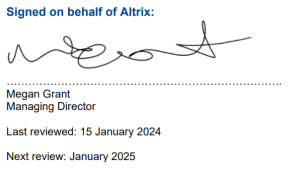Altrix Technology Limited – Modern Slavery Policy
Introduction:
Altrix Technology Limited (Altrix) is committed to preventing modern slavery and human trafficking in all its forms. As part of our corporate social responsibility and commitment to ethical business practices, we have developed this Modern Slavery Policy to outline our approach to identifying and addressing modern slavery risks in our operations and supply chains.
Policy Statement:
- Transparency in Supply Chains:
- Altrix acknowledges the requirements of the Modern Slavery Act 2015 and is committed to complying with its provisions. We will produce an annual Modern Slavery Statement outlining the steps we have taken to ensure that modern slavery and human trafficking are not taking place in our operations or supply chains.
- Prevention of Modern Slavery:
- Altrix prohibits all forms of modern slavery, including slavery, servitude, forced or compulsory labour, and human trafficking, within our operations and supply chains. We will not tolerate any form of exploitation or coercion of workers, whether direct employees or within our supply network.
- Due Diligence in Supply Chains:
- Altrix will conduct due diligence in our supply chains to identify and assess any risks of modern slavery. We will work collaboratively with our suppliers to address identified risks and implement appropriate measures to mitigate them effectively.
- Protection of Vulnerable Groups:
- Altrix is committed to supporting and protecting vulnerable groups, including victims of modern slavery and human trafficking. We will provide training and awareness programs for our employees to recognize the signs of modern slavery and report any concerns appropriately.
- Collaboration and Reporting:
- Altrix will collaborate with relevant stakeholders, including government agencies, NGOs, and industry partners, to combat modern slavery effectively. We will also maintain open communication channels for reporting any suspicions or incidents of modern slavery within our operations or supply chains.
Responsibilities:
- Senior Management: Senior management at Altrix is responsible for ensuring compliance with this Modern Slavery Policy and providing the necessary resources to implement and maintain effective anti-slavery measures.
- Employees: All employees of Altrix are expected to familiarise themselves with this policy, adhere to its principles, and report any concerns or suspicions of modern slavery promptly.
Review and Improvement:
This Modern Slavery Policy will be reviewed annually and updated as necessary to reflect changes in legislation, industry best practices, and the evolving nature of modern slavery risks. Altrix is committed to continuous improvement in our efforts to prevent and combat modern slavery.
Approval:
This Modern Slavery Policy has been approved by Megan Grant, Managing Director and is effective from 1 February 2024. The next review will be in January 2025.

